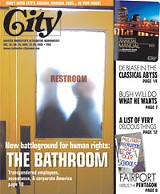New battleground for human rights: the bathroom
Transgendered employees, acceptance, and corporate America
By Jennifer Loviglio[
{
"name": "500x250 Ad",
"insertPoint": "5",
"component": "15667920",
"parentWrapperClass": "",
"requiredCountToDisplay": "1"
}
]
For Joey, a day at the amusement park is fraught with tension. But then, every day has had its share of difficulties since Joey, born female, started dressing like the boy he feels he is.
"I look like a boy, I consider myself a boy," the 23-year-old SUNY Brockport undergrad says. But because he has not started hormone treatments and is still biologically female, Joey --- who asked that his female name not be printed --- uses women's restrooms if he can't find a unisex bathroom.
Last summer a woman pulled a knife on him in the changing room at a local amusement park. He was changing out of his boardshirt and beater, worn in layers to conceal his breasts. "Some lady with a 13-year-old daughter started screaming, 'You don't belong here,'" Joey says. She took out a knife and Joey left. Fast.
Public bathrooms are undoubtedly the most dangerous places for transgendered people. As a result, a fledgling movement to increase the number of gender-neutral bathrooms is gaining momentum, as is awareness of transgender issues and rights.
Students at a handful of universities have made the news in the past year demanding gender-neutral bathrooms and locker rooms. But the media has been strangely silent about the real forefront of what might well be the next major social revolution. Quietly --- without rallies or lobbyists, without petitions or any of the traditional tools of rights movements --- an unlikely ally is championing transgender rights: corporate America.
"Transgender" is a catch-all phrase that includes post-operative transsexuals, people transitioning between sexes, and gender queers. Gender queers don't identify themselves as either strictly male or female. Although no one knows how many transgendered people there are --- or if their numbers are even growing --- in recent years more young people are expressing their gender identity outside of traditional male/female categories.
"More and more young people don't want to be put in a box," says Pam Barres, director of the Rochester Transgender Group. "Traditionally, you picked a gender and went almost stereotypically in that direction. That's not happening now with young people."
The topic of bathroom safety comes up more often now according to Toby Greenfield, youth services director at the Gay Alliance of the Genesee Valley. "It's tough for kids to constantly worry about that kind of stuff, constantly deciding which bathroom to go in," he says. "Either way they can be caught off guard and made to feel uncomfortable."
There's a wide spectrum of transgender appearance, Barres says. "There are people who are transitioning from male to female or vice versa, or who may never have completed surgery. Their plumbing might not be appropriate plumbing for the sign on the [bathroom] door," she says. "When people are first switching from one gender to another, they don't look male or female." And gender queers don't fit easily into either category, Barres says.
Transgendered students at a few schools, such as the University of Chicago and Wesleyan, have persuaded their administrations to designate gender-neutral bathrooms. No such steps have been taken at the University of Rochester or SUNY Brockport, according to school representatives and campus gay rights activists. A spokesperson at Brockport was unfamiliar with the issue and terminology. He later reported that gender identity had never been raised with student advisors, the residential life office, the department of public safety, or the president's office.
Twenty-five miles away at the Rochester Institute of Technology, the situation is somewhat better. Transgender rights are so important to President Al Simone that he mentioned them in a community address last fall. RIT has added several dozen new unisex bathrooms in the past year to accommodate the school's handful of transgendered students. And Simone is encouraging RIT's governance groups to add "gender identity and gender expression" to the school's anti-discrimination policy.
When asked if some of the university's more stodgy board members will go along with the policy change, Simone admits it might be hard for some, but that's no reason not to forge ahead. "I don't claim to understand why [transgendered] people feel the way they do," Simone says, "but just because I don't understand it doesn't mean I can't respect it."
At first glance these might seem like cutting-edge changes in an era when Republicans rule the roost and gay marriage can't seem to get a break. But corporations have been much more progressive than schools in protecting and accommodating transitioning employees, according to Todd Plank, community relations and outreach coordinator at Gay Alliance of Genesee Valley. In fact, several area companies have been so successful in supporting their transgendered employees they've won local and national attention for their efforts.
With collective consciences raised by roughly a decade of diversity training and the advent of employee networks --- groups of workers who gather to discuss issues important to blacks, women, Hispanics, and the GLBT community, etc., respectively --- corporate America is putting its money where its diversity statement is.
Plank holds up Kodak, in particular, as a company with an excellent reputation in the GLBT community. Kodak's internal employee handbook offers guidelines for those changing gender. It offers suggestions on how to work with the immediate supervisor and local human resources person, according to David Kassnoff, manager of communications and public relations at Kodak.
The handbook also offers the locations of unisex bathrooms in Kodak Park. "We acknowledge the fact that restrooms and locker rooms are sensitive issues for transgender employees and the people they work with," Kassnoff says. "When there is a further need, [another] bathroom is designated as unisex."
In a company with such diverse workspaces, there's no single process for transitioning employees. Instead, Kassnoff says, the company consults community experts, such as GAGV and Kodak's GLBT employee network, Lambda, to tailor solutions.
Plank isn't the only one giving Kodak high marks for its progressive approach. The company has earned a 100 percent rating from the Human Rights Campaign, a national advocacy group for the GLBT population, for three years running. HRC's three-year-old Corporate Employer Index ranks Fortune 500 companies on specific accomplishments, such as adding "gender identity and/or gender expression" to corporate non-discrimination policies and offering diversity training that includes sexual orientation and/or gender identity and expression in the workplace.
Until recently, the only makeup Jeremy could wear comfortably in public was the black and green smears of camouflage paint he wore as an Airborne Rangers in Afghanistan. He had enlisted for the same reason many boys join the armed forces --- he thought it would make him a man. But the stakes were higher for Jeremy. Growing up in Rochester, he had always felt more like a girl than a boy.
In 10th grade his mother, a strict Pentecostal who disapproved of his leanings, took him to see Saving Private Ryan. "These are real men," she told her son. "That got stuck in my brain, that real men equals soldiers and killing people," Jeremy, now Jessica --- a 22-year-old pretty, slender woman --- said in a recent phone interview. He enlisted after high school.
"I graduated from basic training and I still wanted to be a girl. I thought, 'What the heck is wrong with me? Maybe when I graduate Airborne school I'll be tougher.' Same thing." Then Ranger training. Then sniper training. "I still wanted to be a girl." His parents, he knew, would be devastated. Then a close friend died in combat. Jeremy put a gun in his mouth and pulled the trigger. Nothing happened.
"The bullet was struck by the firing pin," Jessica said, sounding, for a moment, like a soldier. "It was just a dead bullet. It's uncommon."
Suicide attempts and suicidal thoughts are a big problem among transgendered people, Rochester Transgender Group's Barres says. Barres met Jessica at an RTG meeting after the former soldier moved back to Rochester recently.
"People feel they are born in the wrong gender, the wrong sex," Barres says. "When the gun misfired she realized it was time to go on with life."
Later, back in the States, Jeremy felt renewed and lucky. He threw himself into learning about his options. He was working at a Best Buy in New Hampshire when he started hormone replacement therapy to transition to a woman. For the most part, Jessica says, Best Buy was supportive, going so far as paying for the first five sessions with a therapist.
Best Buy, like Kodak, received a 100 percent rating from HRC and participates in Out and Equal, according to Julie Schlueter, diversity project manager at Best Buy. Although the company does not track transgendered employees, Schlueter says, Jeremy is not the first employee to make the switch. In addition to paying for counseling, in some circumstances the company's insurance may even pay for medical expenses incurred during transition.
"There are an awful lot of ways to state what you're undergoing. I'm undergoing hormone replacement therapy," Schlueter says. "I do it because I had a hysterectomy. Others do it for other reasons. We don't sit around splitting hairs."
Schlueter was not alone among company spokespeople in taking these issues in stride.
"It was no big deal, really," Libby Gallis, marketing manager at Nixon Peabody law firm, says about an employee's transition within the past five years. "We did whatever we had to do to support this person."
The employee, who did not want to be interviewed, met with the human resources director for a year before they decided, together, to announce the transition. "We hired a clinical social worker with an expertise in transgender issues to come in and give classes to the employees," Gallis says.
Did any of the employees have a difficult time with the situation? "When people get more information it obviously helps them deal with things," Gallis says. "Everyone was very supportive; the person had been with the firm a long time."
In response to concerns that some employees, including the transgendered worker, might not be fully comfortable during transition, a bathroom was designated as unisex. It was also renovated, Gallis says, "to make sure it was nicer."
Jeremy wasn't so lucky. Despite Best Buy's perfect HRC score and sensitive management team, a major obstacle stood between Jeremy on his journey to becoming a woman: the bathroom.
When Jeremy first started dressing as Jessica, complete with a padded bra and makeup, she didn't "pass." A picture taken in the early months of hormone replacement therapy reveals her heart-shaped face, glistening lip gloss, and incongruous knotty, muscular arms. (A link to an online photo album of her transition appears in our list of resources.)
"[Best Buy] said, 'we support your diversity, we think it's really cool that you're transitioning,'" Jessica says. "'But you can't use our bathrooms because you'll scare our customers off.'" She had to use the mall bathrooms, where security guards and customers harassed her. "The looks people shot me," she says. "Someone threatened to call the cops and I just sprinted out of there."
This anecdote troubles Best Buy's Schlueter, who is based in the company's suburban Minnesota headquarters. "Every top level policy we have has to play out on a local level," she says. "We haven't created messaging at the local level. We have work to do in seeing that this plays out better. We're going to formulate messaging that goes to local HR representatives to ensure that they're very clear about doing things differently next time."
Despite Schlueter's best intentions, it's hard to imagine a big-box retailer, whose market edge is defined by low prices, will shell out for unisex bathrooms in all its stores. What, realistically, can Best Buy do? Schlueter suggests that maybe inclusion, not construction, is the answer.
"[Customers] might be made to feel uncomfortable by wheelchairs. That doesn't mean we're going to back away from it," she says. "We need to create an environment where every employee feels comfortable."
Other diversity issues can be trumpeted by corporations publicly and then quietly swept under the rug. The needs of transitioning employees and their coworkers, however, require attention and the commitment of a variety of resources. With these issues affecting a seemingly small percentage of the population, why do companies bother?
One of the driving forces behind corporate America's embrace of this new wave of diversity is the Human Rights Campaign's Corporate Equality Index, which has had an influence on the 21st century corporation. Now entering its fourth year, it surveys the top 200 Fortune 500 companies and other large, privately held corporations. The power it wields is hard to understate. Nearly everyone I spoke to brought up the HRC Index in explaining why they strive to improve their treatment of GLBT employees. They also use it as a road map for further improvements.
"We're at where [HRC] wants us to be," Best Buy's Schlueter says. "We continue to follow their suggestions. They ask specific questions in their questionnaire annually so we understand what best-practice expectations are."
The introduction to the Human Rights Campaign's 2004 Corporate Equality Index states that it "has helped spur an exponential rise in the number of firms that protect employees on the basis of gender identity and/or expression." There's been a 347 percent increase in companies that meet this criterion, according to HRC. Many do it, HRC claims, because they want to earn the 100 percent rating. It's become a badge of honor.
Kara Choquette, manager of corporate relations at Xerox, boasts of several recent awards the company has won for diversity, including a 100 percent HRC ranking. "Our diversity statement includes gender identity and gender expression," Choquette says. "We take a progressive stance and make a commitment to all employees that Xerox will provide a supportive environment."
This kind of recognition is nice and all, but does it mean anything more than just another plaque on the wall at corporate headquarters? Absolutely, according to Xerox's Choquette. It helps corporations attract and retain employees. "The war on talent is tough," she says. "We want to keep the best and brightest."
Best Buy's Schlueter agrees. "Right at the very core of our values is to unleash the power of people," she says. "People are how we're going to win in the marketplace." It doesn't make sense to discriminate against any one group, she says. "If you're going to start peeling off which few here and which few there, we'll start losing major numbers of people who won't be Best Buy supporters."
Kodak's Kassnoff offered an example of how its diverse workforce gives the company a competitive edge. About a decade ago, the black-box 35-mm cameras were doing well in North American markets, but not in Asia. "It took insight from our employees in Asia," Kassnoff says, "to tell us, 'the camera works fine but it's too big for our hands, and we don't want to hold a bulky black camera, it's not stylish.'" Now, he points out, cameras are curvy and come in shiny silver finishes, "like a big piece of jewelry." They sell well, he says, in all markets.
Still, corporate America has a long way to go toward making transgendered employees feel supported and safe. The Human Rights Campaign's Corporate Employer Index lists many companies that are not welcoming to GLBT employees, among them Exxon Mobil Corp and International Steel Group, which both scored 14 percent, and ALLTEL, which scored a zero (its closest competitors, BellSouth and Verizon, each scored 86 percent). And it remains to be seen whether the strides the transgender community is making will continue at the corporate level, or if universities will catch up.
We may be entering a new era based not on feel-good philosophies like doing the right thing, but driven, rather, by global competition and the "war on talent." Even if we aren't, it's a brand new day when corporations aspire to serve as social role models. As Best Buy's Julie Schlueter said: "We're all learning and trying to do the best we can to shape society on how they think of this."
Resources
Rochester Transgender Group: www.rnytg.org
Gay Alliance of Genesse Valley: www.gayalliance.org
Jessica's online photo album: pg.photos.yahoo.com/ph/transgirl22ny/album?.dir=/e37e&.src=ph&.tok=phWlphCB.Yhsu2Zo
Speaking of...
-

Not at liberty Big Brother turns PATRIOT
Dec 17, 2003 - More »
Latest in Featured story
More by Jennifer Loviglio
-
The XX Files
Nov 15, 2006 -

Silent (politically correct) night
Nov 15, 2006 -
Escape to Jennitopia
Nov 1, 2006 - More »






